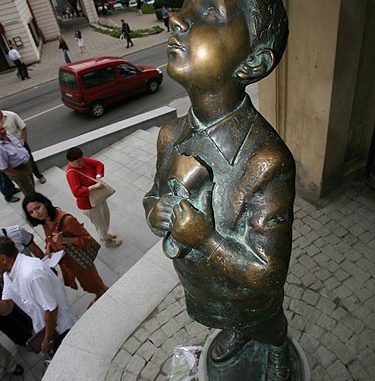
Born in Vilnius in 1914, Roman Kacew has spent his childhood at Basanavičius street 18 that he thoroughly described in his autobiographical novel Promise at Dawn (La promesse de l’aube). Raised by a single mother, at the age of twelve Roman leaves his native town and moves to Nice where, years later, he begins his career as a writer.
In memory of this eminent personality, the statue of a nine year-old boy with a rubber boot galoshe was unveiled a couple of years ago. On the corner of Basanavičius and Mindaugas streets, the bronze sculpture created by R. Kvintas and a memorial plaque on a wall of the building where the writer lived is now called a date spot. It will always remind the residents and guests of a story about a little boy who ate a rubber boot to get the attention of Valentine – the girl that he sympathized.
The French Institute in Vilnius, with assistance of Honkytonk and OVH, have created a webdoc – an interactive presentation of life of Romain Gary. Interested francophones can get acquainted with his early life, read short analysis of his most prominent works, listen to the interviews with his friends and co-workers, even hear some anecdotes from his personal life. To promote the webdoc and events dedicated to Gary, many posters were put up around Vilnius.
The Romain Gary fever has spread elsewhere as well. On 4th of October The Kaunas National Drama Theatre has premiered the play Promise at Dawn (Aušros Pažadas) directed by A. Sunklodaitė. “I am sure that Gary’s Promise at Dawn should have seen the light a long time ago. It speaks about values. It is very important in a period when the term of “modern values” appears. As if the eternal ones are no longer relevant,” explained E. Stancikas, the Theatre Director in the interview to alkas.lt. The play can be seen on 30th of November and 2nd of December in Kaunas.
Lithuanian and French Embassies in Belgium and French Institute in Lithuania have held a screening of biographical movie In search of Romain Gary to reveal the different sides of the mysterious writer. The authors mention that the purpose of their work was to search and not to investigate. They were positive that it was impossible to truthfully reflect his life and work, a constantly mangled and rewritten story. Romain Gary himself, presented different versions of his parents’ origins, ancestry, occupation and his own childhood in his books every time.
Many various representations of the Litvak from Vilnius will fill Lithuania and francophone countries in 2014 to remind the public of an important personality, encourage to read and discover the world famous writer, the only one to win two Goncourt prizes.

Be the first to comment